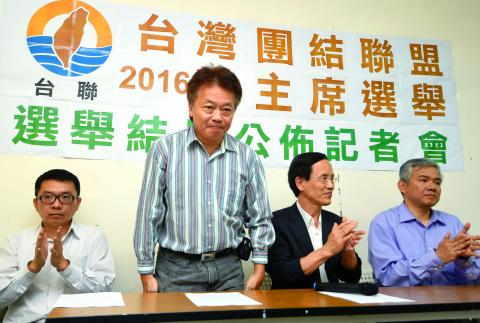Former Taiwan Solidarity Union (TSU) secretary-general Liu I-te (劉一德) was yesterday elected the new party chairman with 85 votes, defeating Taipei City Councilor Chen Chien-ming (陳建銘), who garnered 56 votes.
The voter turnout for the party’s first chairmanship election in its history was only 26.7 percent.
Upon his election, Liu said that besides continuing to defend Taiwan’s sovereignty, the TSU would also work on the 2018 local elections, with plans to nominate younger and more-likely-to-win candidates for local councils, adding that he hopes the TSU would win at least between 10 and 20 seats in local councils to revive the party.

Photo: Fang Pin-chao, Taipei Times
The TSU won no seats in the Jan. 16 legislative elections, losing the three seats that it had held.
The New Party had only 1.4 percent of legislator-at-large votes in the 2012 election, but the number increased to more than 4 percent this year, Liu said, adding: “I am not so pessimistic about the future of smaller parties in Taiwan.”
Liu said that many young people consider the TSU a party of “uncles,” but he does not plan to serve as party chairman for too long and hopes to give the party leadership to younger people to create a new-generation TSU.
Chen said that there are only a little over 500 people on the TSU’s list of permanent members and about 30 percent of their contact information is invalid, adding that he wanted to have the election suspended.
Liu said he and Chen had previously visited former president Lee Teng-hui (李登輝), who is considered the TSU’s “spiritual leader,” as the TSU was established in July 2001 after Lee called for a party to give pro-localization voters more choices.
Liu said they visited Lee to discuss whether the election result should be voided when the voter turnout is below 30 percent.
Liu said he supported the idea at the time, and made a motion to be discussed in the TSU central executive committee meeting.
However, many committee members opposed the proposal, saying if there was a threshold, candidates who lag behind might mobilize party members to be absent from voting.
“It would be strange if people who act against principles of democracy have a better opportunity of winning,” Liu said, adding there are no thresholds in other major political parties in Taiwan.
Chiayi City Councilor Tsai Yung-chuan (蔡永泉), who is also a TSU central executive committee member, said that many TSU members are not paying their dues and the party has lost contact with them, so it would be hard to find them, but promised the party would improve.
Chen yesterday said he respected the results of the election.
Chen said that it would be horrible and regrettable if the electoral system causes problems for the TSU’s development and called on the party to expand its supporter base, and be more transparent.

A preclearance service to facilitate entry for people traveling to select airports in Japan would be available from Thursday next week to Feb. 25 at Taiwan Taoyuan International Airport, Taoyuan International Airport Corp (TIAC) said on Tuesday. The service was first made available to Taiwanese travelers throughout the winter vacation of 2024 and during the Lunar New Year holiday. In addition to flights to the Japanese cities of Hakodate, Asahikawa, Akita, Sendai, Niigata, Okayama, Takamatsu, Kumamoto and Kagoshima, the service would be available to travelers to Kobe and Oita. The service can be accessed by passengers of 15 flight routes operated by

Alain Robert, known as the "French Spider-Man," praised Alex Honnold as exceptionally well-prepared after the US climber completed a free solo ascent of Taipei 101 yesterday. Robert said Honnold's ascent of the 508m-tall skyscraper in just more than one-and-a-half hours without using safety ropes or equipment was a remarkable achievement. "This is my life," he said in an interview conducted in French, adding that he liked the feeling of being "on the edge of danger." The 63-year-old Frenchman climbed Taipei 101 using ropes in December 2004, taking about four hours to reach the top. On a one-to-10 scale of difficulty, Robert said Taipei 101

Taiwanese and US defense groups are collaborating to introduce deployable, semi-autonomous manufacturing systems for drones and components in a boost to the nation’s supply chain resilience. Taiwan’s G-Tech Optroelectronics Corp subsidiary GTOC and the US’ Aerkomm Inc on Friday announced an agreement with fellow US-based Firestorm Lab to adopt the latter’s xCell, a technology featuring 3D printers fitted in 6.1m container units. The systems enable aerial platforms and parts to be produced in high volumes from dispersed nodes capable of rapid redeployment, to minimize the risk of enemy strikes and to meet field requirements, they said. Firestorm chief technology officer Ian Muceus said

MORE FALL: An investigation into one of Xi’s key cronies, part of a broader ‘anti-corruption’ drive, indicates that he might have a deep distrust in the military, an expert said China’s latest military purge underscores systemic risks in its shift from collective leadership to sole rule under Chinese President Xi Jinping (習近平), and could disrupt its chain of command and military capabilities, a national security official said yesterday. If decisionmaking within the Chinese Communist Party has become “irrational” under one-man rule, the Taiwan Strait and the regional situation must be approached with extreme caution, given unforeseen risks, they added. The anonymous official made the remarks as China’s Central Military Commission Vice Chairman Zhang Youxia (張又俠) and Joint Staff Department Chief of Staff Liu Zhenli (劉振立) were reportedly being investigated for suspected “serious